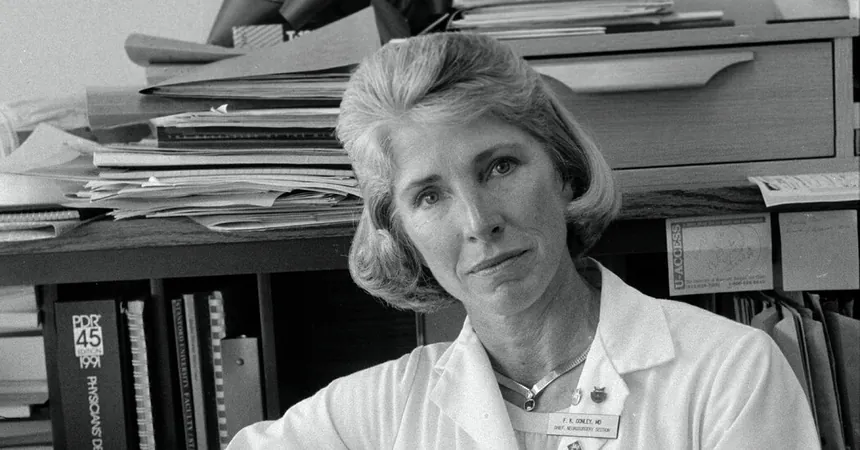
Frances Conley: Pioneering Neurosurgeon and Advocate Against Sexism Dies at 83
2024-10-10
Author: Ling
Dr. Frances Conley, a trailblazing neurosurgeon renowned for her courageous stance against sexism in the medical field, passed away on August 5 at the age of 83, in her home in Sea Ranch, California. Her death, due to complications from dementia, was confirmed by Stanford University, where she made headlines in 1991 when she resigned from her position amid an environment rife with sexual harassment.
At the time of her resignation, Conley was one of the only female neurosurgeons in the United States and a tenured professor at Stanford School of Medicine. She often found herself enduring the inappropriate behaviors of male colleagues, from unwanted physical contact to derogatory remarks, which she initially accepted as part of thriving in a predominantly male-dominated field. However, the promotion of a particularly egregious colleague who had mistreated her pushed her to take a stand. She famously stated in her resignation announcement that she could no longer pretend to 'be one of the boys.'
In her poignant memoir, "Walking Out on the Boys," published in 1998, she expressed her frustrations over being dismissed and belittled and shared her desire to reclaim her dignity. Dr. Conley specialized in complex spinal surgeries and researched brain tumors but recognized that her most significant contribution to medicine was her bold public admission of the injustices women faced in academia and beyond.
Following her resignation, Conley became a beacon of empowerment, encouraging other women within the medical community to share their experiences of harassment and discrimination. This led to a slow but powerful reckoning long before the #MeToo movement transformed the conversation around sexual misconduct in various professional environments.
Dr. Conley’s influence stretched far beyond her surgical prowess. Her candid discussions about workplace harassment prompted female medical professionals across the country to step forward and demand change. Her clarity in recognizing her own complicity in a broken system led to a broader awareness of the systemic issues affecting women in medicine.
Born Frances Krauskopf on August 12, 1940, in Palo Alto, California, she grew up on the Stanford campus, where her father was a professor. She graduated from Bryn Mawr College before transferring back to Stanford's medical school, where she broke barriers, becoming the institution's first female surgical resident. Following her graduation, she initially considered other specialties but ultimately fell in love with neurosurgery due to its profound impact on patients’ lives.
While navigating her demanding career, Dr. Conley maintained a supportive partnership with her husband, Philip Conley, an Olympic athlete and well-educated man who adapted his life to accommodate her thriving medical career. The couple chose to forgo parenthood, focusing instead on their mutual passion for mentoring the next generation of medical professionals.
Dr. Conley also made her mark in athletics, famously becoming the first woman to finish a race across San Francisco in 1971, the same year women were allowed to participate. Interestingly, she had previously run the race in disguise, showing her determination to compete in a male-dominated arena.
Despite her significant strides for women in medicine, the statistics remain troubling. As of a 2021 study, women still comprised only 8.2 percent of practicing neurosurgeons in the U.S., a slight increase from 5.9 percent in 2008. Dr. Conley’s legacy prompts ongoing discussions about gender equity in medicine. Dr. Odette Harris, the first female neurosurgeon promoted to full professor at Stanford since Dr. Conley, acknowledges the trailblazing path that Conley forged, stating, 'My experience could not have been possible without hers.'
The need for cultural change in medicine continues, as recent studies indicate that nearly one in three women in academic medicine report experiencing sexual harassment. Dr. Frances Conley's impact resonates as a reminder of the work that remains, and her legacy will undoubtedly inspire future generations of women in medicine to advocate for themselves and each other.



 Brasil (PT)
Brasil (PT)
 Canada (EN)
Canada (EN)
 Chile (ES)
Chile (ES)
 España (ES)
España (ES)
 France (FR)
France (FR)
 Hong Kong (EN)
Hong Kong (EN)
 Italia (IT)
Italia (IT)
 日本 (JA)
日本 (JA)
 Magyarország (HU)
Magyarország (HU)
 Norge (NO)
Norge (NO)
 Polska (PL)
Polska (PL)
 Schweiz (DE)
Schweiz (DE)
 Singapore (EN)
Singapore (EN)
 Sverige (SV)
Sverige (SV)
 Suomi (FI)
Suomi (FI)
 Türkiye (TR)
Türkiye (TR)